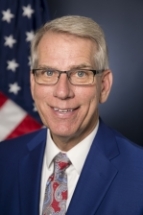
The lieutenant governor of Nebraska is the highest-ranking executive official in the State of Nebraska after the governor. According to the Nebraska State Constitution, in the event a governor dies, becomes permanently incapacitated, resigns, or is removed from office, the lieutenant governor will become governor.
The following table indicates the party of elected officials in the U.S. state of Nebraska :
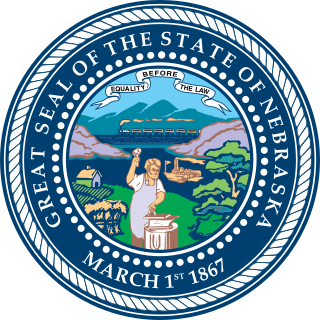
The Nebraska Legislature is the legislature of the U.S. state of Nebraska. The Legislature meets at the Nebraska State Capitol in Lincoln. With 49 members, known as "senators", the Nebraska Legislature is the smallest U.S. state legislature. A total of 25 members is required for a majority; however, in order to overcome a filibuster, a two-thirds vote of all members is required, which takes 33 votes.

The 1896 South Dakota gubernatorial election was held on November 3, 1896. Incumbent Republican Governor Charles H. Sheldon declined to run for re-election to a third term. Former Secretary of State Amund O. Ringsrud was nominated as Sheldon's replacement at the Republican convention. Ringrud's main opponent was businessman Andrew E. Lee, who was nominated by a makeshift coalition of Populists, Free Silver Republicans, and Democrats. In the general election, Lee narrowly defeated Ringsrud, the first defeat for the Republican Party in a gubernatorial election since statehood.

The 1898 South Dakota gubernatorial election was held on November 8, 1898. Incumbent governor Andrew E. Lee, elected in 1896 as a Populist, he ran for re-election as a Fusion candidate. He was challenged by Republican nominee Kirk G. Phillips, the state treasurer. Lee narrowly defeated Phillips to win his second term as governor, but most of his Fusion allies lost their elections, leaving him as the lone statewide officeholder.
Carol Blood is an American politician from the U.S. state of Nebraska. In 2016, she was elected to represent District 3 in Sarpy County in the Nebraska Legislature with 51.56% of the vote. In 2020 she was re-elected with 50.4% of the vote. She was the Democratic nominee in the 2022 Nebraska gubernatorial election. Blood is a member of the Democratic Party, though elections to the Nebraska Legislature are officially nonpartisan.
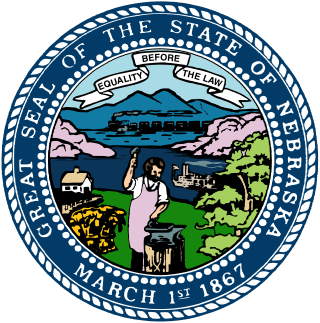
The 1974 Nebraska gubernatorial election was held on November 5, 1974, and featured incumbent Governor James Exon, a Democrat, defeating Republican nominee, state Senator Richard D. Marvel. Independent state Senator Ernie Chambers also captured 5% of the vote as a write-in candidate. This was the first gubernatorial election in Nebraska in which the nominees for Governor and Lieutenant Governor ran as a single ticket in the general election, though they were chosen in separate primary elections.
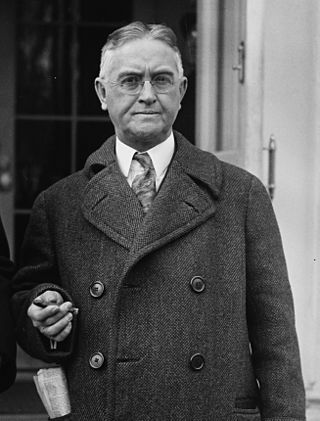
The 1924 Nebraska gubernatorial election was held on November 4, 1924, and featured former state Senator Adam McMullen, a Republican, defeating Democratic nominee, former state Representative John N. Norton, and Progressive nominee, Omaha City Commissioner Dan B. Butler.

The 1904 Nebraska gubernatorial election was held on November 8, 1904. Incumbent Republican Governor John H. Mickey won re-election to a second term, defeating Democratic and Populist fusion nominee George W. Berge with 49.67% of the vote.

The 1900 Nebraska gubernatorial election was held on November 6, 1900.

The 1898 Nebraska gubernatorial election was held on November 8, 1898. Incumbent Populist Governor Silas A. Holcomb did not stand for re-election. Populist and Democratic fusion nominee William A. Poynter defeated Republican nominee Monroe Hayward with 50.19% of the vote.

The 1878 Nebraska lieutenant gubernatorial election was held on November 5, 1878, and featured Republican nominee Edmund C. Carns defeating Greenback and Democratic nominee Theron M. Blakely as well as the original Democratic nominee F. J. Mead who still received some votes. Originally, the Democratic party had nominated F. J. Mead for lieutenant governor. However, in late October 1878, the state central committees of the Democratic and Greenback parties met in Lincoln, Nebraska, and decided to replace F. J. Mead with Greenback candidate Theron M. Blakely on the ticket for lieutenant governor.

The 1910 Nebraska lieutenant gubernatorial election was held on November 8, 1910, and featured incumbent Nebraska Lieutenant Governor Melville R. Hopewell, a Republican, defeating Democratic nominee Ralph A. Clark as well as Socialist Party nominee George L. Slutter and Prohibition Party nominee Samuel Lichty.

The 1894 Nebraska lieutenant gubernatorial election was held on November 6, 1894, and featured Republican nominee Robert E. Moore defeating Populist and Democratic fusion nominee James N. Gaffin as well as Straight Democratic (anti-Populist) nominee Rodney E. Dunphy and Prohibition Party nominee Belle G. Bigelow.

The 1896 Nebraska lieutenant gubernatorial election was held on November 3, 1896, and featured Populist and Democratic fusion nominee James E. Harris defeating his major rival, Republican nominee Orlando Tefft. Other candidates who received two percent of the vote or less included Gold Democratic nominee Owen F. Biglin, Prohibition nominee Lucius O. Jones, Socialist Labor nominee Fred Herman, and National Silver nominee Oscar Kent. Incumbent Nebraska Lieutenant Governor Robert E. Moore did not seek reelection.
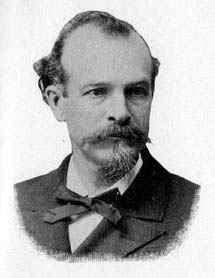
The 1900 Nebraska lieutenant gubernatorial election was held on November 6, 1900, and featured Republican nominee Ezra P. Savage defeating incumbent Nebraska Lieutenant Governor Edward A. Gilbert, the Populist and Democratic fusion nominee. Other candidates who received two percent of the vote or less included Prohibition nominee Charles R. Lawson, Midroad Populist nominee Herman G. Reiter, and Social Democratic nominee David McKibben.
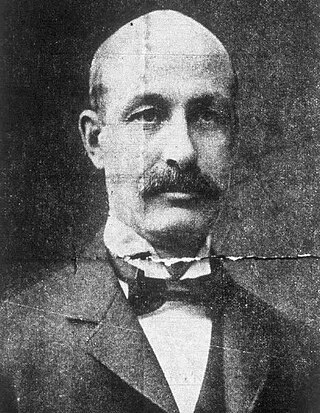
The 1902 Nebraska lieutenant gubernatorial election was held on November 4, 1902, and featured Republican nominee Edmund G. McGilton defeating Edward A. Gilbert, the Populist and Democratic fusion nominee, as well as Prohibition nominee Isaiah Lightner and Socialist nominee Andrew D. Peugh.

The 1904 Nebraska lieutenant gubernatorial election was held on November 8, 1904, and featured incumbent Nebraska Lieutenant Governor Edmund G. McGilton, a Republican, defeating Adelbert Townsend, the Populist and Democratic fusion nominee, as well as Prohibition nominee Isaiah Lightner and Socialist nominee Thomas Carroll.

The 1906 Nebraska lieutenant gubernatorial election was held on November 6, 1906, and featured Republican nominee Melville R. Hopewell, defeating William H. Green, the Democratic and Populist fusion nominee, as well as Prohibition nominee J. D. Forsythe and Socialist nominee C. A. Howe.












